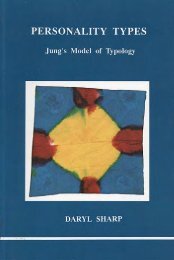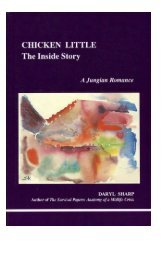Digesting Jung: Food for the Journey - Inner City Books
Digesting Jung: Food for the Journey - Inner City Books
Digesting Jung: Food for the Journey - Inner City Books
Create successful ePaper yourself
Turn your PDF publications into a flip-book with our unique Google optimized e-Paper software.
13<br />
The Self-Regulation of <strong>the</strong> Psyche<br />
Only what is really oneself has <strong>the</strong> power to heal. 39<br />
If I were asked to choose one remark of <strong>Jung</strong>’s that in<strong>for</strong>ms my attitude<br />
as an analyst, that would be it. The whole process is <strong>the</strong>re, including<br />
<strong>the</strong> idea that neurosis is an attempt at self-cure. And what is<br />
really oneself can only be discovered through holding <strong>the</strong> tension<br />
between <strong>the</strong> opposites until <strong>the</strong> “third”—something not logically<br />
given—manifests. How this third, <strong>the</strong> so-called transcendent function,<br />
makes itself known depends on individual psychology and<br />
circumstances. But in <strong>Jung</strong>’s model it always represents <strong>the</strong> creative<br />
intervention and guidance of <strong>the</strong> Self, <strong>the</strong> archetype of wholeness,<br />
which functions as <strong>the</strong> regulating center of <strong>the</strong> psyche.<br />
In plainer words, <strong>the</strong> Self is a transpersonal power that is beyond<br />
<strong>the</strong> control of <strong>the</strong> ego. It can be experienced, but not easily defined.<br />
In fact, <strong>the</strong>re is no difference between <strong>the</strong> Self as an experiential,<br />
psychological reality and <strong>the</strong> religious concept of a supreme being,<br />
except that <strong>the</strong> traditional idea of God places Him somewhere “out<br />
<strong>the</strong>re.” In <strong>Jung</strong>’s model of <strong>the</strong> psyche, <strong>the</strong> Self is inside.<br />
Here are some significant comments by <strong>Jung</strong> on <strong>the</strong> Self:<br />
Intellectually <strong>the</strong> self is no more than a psychological concept, a<br />
construct that serves to express an unknowable essence which we<br />
cannot grasp as such, since by definition it transcends our powers of<br />
comprehension. It might equally well be called <strong>the</strong> “God within .” 40<br />
Sensing <strong>the</strong> self as something irrational, as an indefinable existent,<br />
to which <strong>the</strong> ego is nei<strong>the</strong>r opposed nor subjected, but merely at-<br />
39 Two Essays on Analytic Psychology, CW 7, par. 258.<br />
40 Ibid., par. 399. Note that <strong>Jung</strong> did not capitalize <strong>the</strong> word “self,” but in modern<br />
<strong>Jung</strong>ian writing it is conventional to do so in order to differentiate <strong>the</strong> Self as archetype<br />
from <strong>the</strong> ego-self.<br />
55










